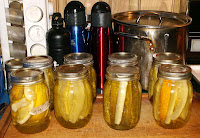Wow...an award? Me? Shucks....
Many thanks to Jacqueline of
Blether fame for it. Oh? It comes with rules? Oh...
Here are the rules as she explained them:
1. Each person must post 11 things about themselves.
2. Answer the questions the tagger has set for you.
3. Choose 11 people and link them in your post.
4. Create 11 questions for the people you've tagged to answer.
5. Go to their page and tell them.
6. Remember, no tag backs!
Here are the questions she has given for me to answer:
1. Why?
Why not? Ok, seriously, to grow into a better person. I hope.
2. You have the power! The superpower! What power is it?
The ability to tell when others are lying.
3. Are you Clark Kent, Magneto, or Wesley from The Princess Bride? Or are you Lois Lane, Cat Woman, or Princess Buttercup?
Cat Woman. Slightly unbalanced, but in an interesting way.
4. You dream of the past, I know you do, what would be your perfect era?
Hmm. Toughie. Either steampunk (beginning of the tech age) or the 1800's.
Both are fascinating.
5. What have you listened to most recently?
Birds, squirrels and my family.
6. In what medium do you best express yourself?
The written word.
7. For 24 hours you may change the world to suit yourself; in what way would you change it?
I would do away with war, killing, poverty and hunger. Everyone would have a home, food and basic needs. Oh, and a job if they wanted it.
8. What comforts you?
Love, a peaceful home, a warm blanket and smiles.
9. You are locked inside a white room, do you try to escape or do you grab crayons and/or paint and use the room as a blank canvas?
I'll take crayons, markers, paint, anything that will allow me to color that room.
10. How difficult is it for you to say no?
Very!
11. You are at peace with yourself; how do you show others how to achieve that peace?
By appealing to their sense of maturity, logic and teaching them how to tune out our "inner babble"
So now it's my turn to nominate some of my favorite bloggers. No tagbacks, damn.
Stephanie the
Yarn Harlot
Paula, from
Weeding For Godot
CD at
Canadian Doomer
Liz at
Darwin Hills Farm
Gaye at
Backdoor Survival
CallieK at
Backyard Farms
FarmGal at
Just Another Day On The Farm
Jarhead Survivor, RangerMan and Calamity Jane over at
SHTF Blog
Todd at the
Prepper Website
Bernie at
The Apartment Prepper
BadVoodoo at
The Retreat
Now to try and provide questions for all you fine folks, no promise there'll be 11 though.
1) What prompted you to start and maintain a blog?
2) What makes you smile?
3) What is your favorite season of the year?
4) Zombies are coming! What's the first thing you do?
5) Are you a tea or coffee kind of person?
6) What hobbies do you have, if any?
7) Do you watch television or read books predominantly?
8) Would you classify yourself as a deep thinker?
9) If you could live anywhere, where would it be?
10) What do you think is the healthiest habit one can have?
11) If society were to go BOOM tomorrow, what would you miss the most?
Hmm, that was easier than I thought.
Back to the outdoor chores!
















